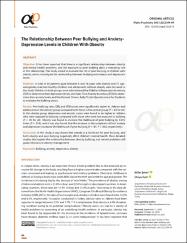The Relationship Between Peer Bullying and Anxiety-Depression Levels in Children With Obesity
Künye
Şahin N, Kırlı U. The relationship between peer bullying and anxiety-depression levels in children with obesity. Alpha Psychiatry. 2021;22(2):94-99.Özet
Objective: It has been reported that there is a significant relationship between obesity and mental health problems, and the exposure to peer bullying plays a mediating role in this relationship. This study aimed to evaluate the risk of peer bullying in children with obesity and to investigate the relationship between bullying and anxiety and depression levels.
Methods: A total of 64 patients aged between 8 and 16 years with obesity and 51 age- and gender-matched healthy children and adolescents without obesity were included in the study. Children in both groups were administered the Children's Depression Inventory (CDI) to determine their depression levels, the State-Trait Anxiety Inventory (STAI) to determine their anxiety levels, and the Revised Olweus Bully/Victim Questionnaire for Students to evaluate the bullying status.
Results: Peer bullying rates, CDI, and STAI scores were significantly higher in children and adolescents in the obesity group compared with those in the control group (P < .05 for all). In the obesity group, depression and anxiety scores were found to be higher in children who were exposed to bullying compared with those who were not exposed to bullying (P < .05 for all). Obesity was found to increase the likelihood of peer bullying by 3.015 times (P = .018), and it was also found that the increase in the symptoms of trait anxiety and depression increased the likelihood of peer bullying (P = .01, P = .002, respectively).
Discussion: In this study, it was shown that obesity is a risk factor for peer bullying, and both obesity and peer bullying negatively affect children's mental health. More detailed studies that explain the relationship between obesity, bullying, and mental problems will guide clinicians in obesity management.


















